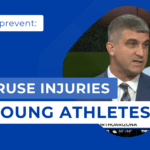Different Types of Heel Fractures
 When you trip and fall, oftentimes, the first part of your foot to hit the ground is your heel. Your “Calcaneus,” aka your “heel bone,” is designed to help shoulder the normal stress that comes with walking and moving. However, if it’s overloaded in a moment of acute trauma, a fracture can occur. In this blog, we’re going to cover how heel bone fractures develop and how an orthopedic/foot specialist can help you treat them.
When you trip and fall, oftentimes, the first part of your foot to hit the ground is your heel. Your “Calcaneus,” aka your “heel bone,” is designed to help shoulder the normal stress that comes with walking and moving. However, if it’s overloaded in a moment of acute trauma, a fracture can occur. In this blog, we’re going to cover how heel bone fractures develop and how an orthopedic/foot specialist can help you treat them.
Understanding the Heel Bone
The heel bone is quite a unique bone that is often compared to a hardboiled egg. It has a hard outer surface that protects a softer, spongier bone on the inside. When a fracture occurs, the outer surface breaks, and the bone can easily collapse and fragment.
Heel bone fractures are often tricky to address because fragmented bone does not always heal as well as non-fragmented fractures. Surgery is often recommended for heel bone fractures due to the complexity and the possibility that the bone could heal incorrectly.
Falls are one of the most common sources of heel bone fractures, but they are far from the only cause. Heel bone fractures can also occur during sporting activities, which take place on hard surfaces like basketball, volleyball, or hockey.
Heel bone fractures are classified as one of two different types:
- Intra-articular fractures: This is the more severe of the two, and it means that the fracture involves the subtalar joint, which provides stability to the foot.
- Extra-articular fractures: These do not involve the subtalar joint, but that doesn’t mean they will be simply managed. These can still result in a fragmented fracture and oftentimes require surgery to address.
Possible Treatment
If you have suffered a foot injury and want to know if you’ve fractured your heel bone or “calcaneus,” speak with an orthopedic doctor. The doctor may begin by asking about your symptoms and how the injury occurred, as well as ask you to perform a few simple physical tests. They then may confirm their observation with the help of an x-ray or similar imaging device, but x-rays tend to be the standard imaging device of choice for this type of potential fracture.
Your doctor may base your treatment on what they see in the imaging test. If there is no fracture, your doctor will likely recommend a few weeks of non-operative treatment paired with a follow-up appointment to ensure healing is going as expected.
Typically, the non-operative treatment simply involves RICE (Rest, Ice, Compression, and Elevation), but your doctor may order a walking boot or cast to help protect the area and prevent stress while healing runs its course.
If you have a displaced fracture or the surgeon believes that the heel is unlikely to heal properly and in a stable location on its own, surgery will be recommended. Your doctor may recommend you wait a little while until the swelling subsides so surgery can be more easily performed.
It is important that you follow your doctor’s post-op rehabilitation guidelines to avoid suffering a setback or causing the operation to fail. Most patients can return to normal activities within 3-4 months of surgery, but more severe fractures can take up to a year or more.
Speak with an Orthopedic Specialist Today
Are you suffering from foot pain? Make an appointment with one of our orthopedic specialists today to start your healing journey. OrthoArizona has nearly two dozen offices throughout the Valley, each focused on quality care, compassion, and excellent customer service. Since 1994, OrthoArizona has been dedicated to compassionate care of the highest quality.
The advice and information contained in this article are for educational purposes only and are not intended to replace or counter a physician’s advice or judgment. Please always consult your physician before taking any advice learned here or in any other educational, medical material.











